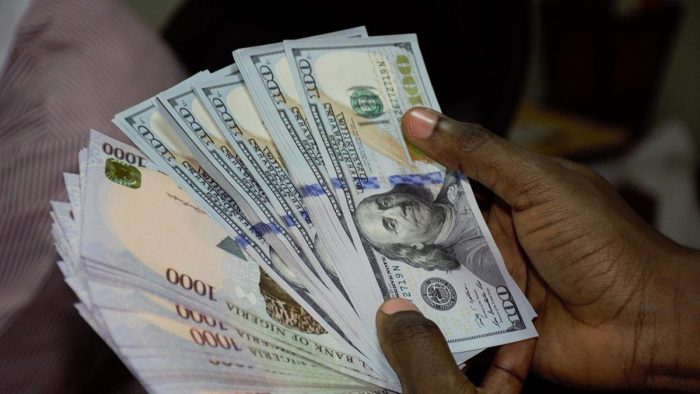Analysts say the renewal of Nigeria’s bilateral currency swap agreement with China will strengthen the naira by increasing its demand by 2025.
On Friday, the naira strengthened against the dollar, trading at N1,535 per dollar compared to N1,537 on Tuesday in the Nigerian Foreign Exchange Market (NFEM), according to data from the Central Bank of Nigeria (CBN).
The development comes as Nigeria renewed its currency swap arrangement with China. The Central Bank of Nigeria (CBN) and the People’s Bank of China (PBOC) jointly announced the renewal, marking a deepening of financial and economic ties between the two countries.
The renewed agreement is valued at N3.28 trillion, equivalent to approximately ¥15 billion or $2.09 billion, and will remain valid for three years, with the possibility of further renewal based on mutual consent.
According to the CBN, the currency swap agreement commenced in July 2018. It expired but was renewed in April 2021. The sum of CNY 15.00 billion was the overdraft amount usable within the year.
Since its renewal, CNY9 billion had been drawn, CNY6 billion utilised and CNY3 billion outstanding.
Out of the CNY6.00 billion utilised, the sum of CNY5.10 billion had been repaid, while CNY2.10 billion had not been utilised, leaving CNY900.00 million yet to be repaid, the CBN stated in 2023.
The currency swap framework aims to facilitate smoother financial transactions between the two nations by enabling direct exchanges of the naira and yuan without reliance on a third-party currency like the U.S. dollar.
According to a statement by the People’s Bank of China, the renewed agreement is expected to enhance bilateral trade and investment. “This renewal underscores our commitment to deepening trade and economic cooperation between Nigeria and China,” the statement noted.
The arrangement simplifies trade processes by giving businesses in both countries easier access to local currencies. This reduces transaction costs and promotes the use of the naira and yuan in international trade, moving away from over-reliance on the dollar.
Trade data from January to October 2024 shows that bilateral trade between the two nations reached $17.12 billion, with Nigeria exporting $2.42 billion worth of goods to China. This represents a year-on-year growth of 34.5 percent, with Nigerian products gaining increased acceptance in the Chinese market.
Consul General Yan Yuqing highlighted the broader benefits of this initiative, saying, “In the future, we will continue to vigorously promote the export of high-quality Nigerian agricultural products and mineral resources to China, fostering stable and balanced growth in bilateral trade.”
Read also : Naira seen hitting N1,804/$ on 2025 volatility projections – Report
Likely Impact
Commenting on the implications of the swap, Ayodele Akinwunmi, senior relationship manager at FSDH Merchant Bank, emphasised the potential of the deal to stabilise the naira.
“The initiative to conduct trade transactions between Nigeria and China using the yuan, instead of the U.S. dollar, has the potential to strengthen the naira. The logic is straightforward as it shifts a significant portion of Nigeria’s trade with China from the dollar to the yuan, reducing the demand for dollars. When demand for a currency decreases while supply remains constant, its value depreciates relative to other currencies, leading to an appreciation of the naira.”
Akinwunmi noted that proper implementation and adherence to agreements are critical to the success of this policy. He noted, “While this initiative has been in place for six years, its impact has been limited by systemic issues. However, under the current administration, there are promising signs of improvement. Fiscal and monetary authorities are working to ensure transparency and discipline in the foreign exchange market.”
Tilewa Adebajo, chief executive officer of The CFG Advisory, said China is Nigeria’s largest trading partner. According to him, imports value last year was about $23 billion, which is significant.
“With that amount of money, you can see that we need more availability of the Chinese currency in the system instead of chasing dollars. Dollar demand is not properly priced,” he said.
Despite the optimism, Muda Yusuf, CEO of the Centre for the Promotion of Private Enterprise (CPPE), pointed out that the overall impact of the currency swap is minimal. He explained, “Over 90 percent of our trade is still conducted in dollars. Even Chinese exporters often demand payment in dollars. The volume of trade conducted in naira is less than five percent of our total trade, and trade with China accounts for an even smaller proportion, probably less than two percent.”
Yusuf quantified the arrangement’s scale, stating, “We are talking about N3.28 trillion worth of trade over three years, which averages around N1 trillion per year. When converted, that’s less than $100 million annually, a negligible fraction compared to our total trade volume of over $17 billion U.S. dollars. While this initiative is commendable, its material impact on the naira and the exchange rate remains negligible.”
Join BusinessDay whatsapp Channel, to stay up to date
Open In Whatsapp





